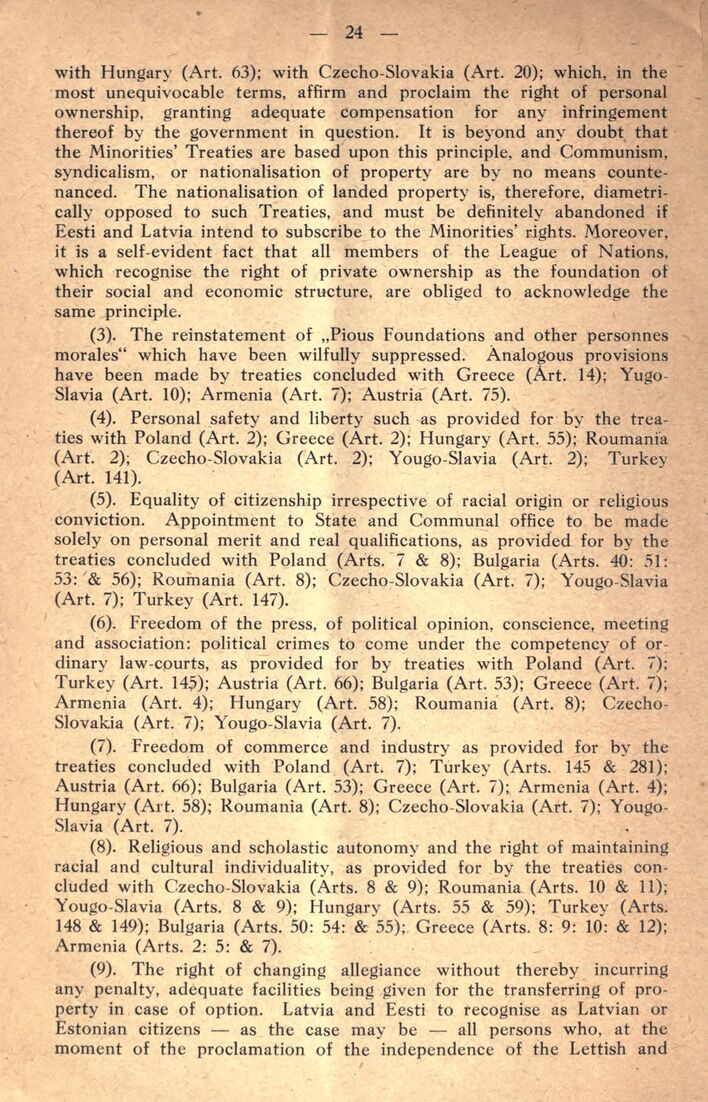
Full resolution (JPEG) - On this page / på denna sida - Chapter III. The Baltic Minorities' Rights detailed. Paper read at the Assembly of the International Law Association at The Hague, September 1921

<< prev. page << föreg. sida << >> nästa sida >> next page >>
Below is the raw OCR text
from the above scanned image.
Do you see an error? Proofread the page now!
Här nedan syns maskintolkade texten från faksimilbilden ovan.
Ser du något fel? Korrekturläs sidan nu!
This page has been proofread at least once.
(diff)
(history)
Denna sida har korrekturlästs minst en gång.
(skillnad)
(historik)
with Hungary (Art. 63); with Czecho-Slovakia (Art. 20); which, in the
most unequivocable terms, affirm and proclaim the right of personal
ownership, granting adequate compensation for any infringement
thereof by the government in question. It is beyond any doubt that
the Minorities’ Treaties are based upon this principle, and Communism,
syndicalism, or nationalisation of property are by no means
countenanced. The nationalisation of landed property is, therefore,
diametrically opposed to such Treaties, and must be definitely abandoned if
Eesti and Latvia intend to subscribe to the Minorities’ rights. Moreover,
it is a self-evident fact that all members of the League of Nations,
which recognise the right of private ownership as the foundation of
their social and economic structure, are obliged to acknowledge the
same principle.
(3). The reinstatement of „Pious Foundations and other personnes
morales“ which have been wilfully suppressed. Analogous provisions
have been made by treaties concluded with Greece (Art. 14);
Yugo-Slavia (Art. 10); Armenia (Art. 7); Austria (Art. 75).
(4). Personal safety and liberty such as provided for by the
treaties with Poland (Art. 2); Greece (Art. 2); Hungary (Art. 55); Roumania
(Art. 2); Czecho-Slovakia (Art. 2); Yougo-Slavia (Art. 2); Turkey
(Art. 141).
(5). Equality of citizenship irrespective of racial origin or religious
conviction. Appointment to State and Communal office to be made
solely on personal merit and real qualifications, as provided for by the
treaties concluded with Poland (Arts. 7 & 8); Bulgaria (Arts. 40: 51:
53: & 56); Roumania (Art. 8); Czecho-Slovakia (Art. 7); Yougo-Slavia
(Art. 7); Turkey (Art. 147).
(6). Freedom of the press, of political opinion, conscience, meeting
and association: political crimes to come under the competency of
ordinary law-courts, as provided for by treaties with Poland (Art. 7):
Turkey (Art. 145); Austria (Art. 66); Bulgaria (Art. 53); Greece (Art. 7);
Armenia (Art. 4); Hungary (Art. 58); Roumania (Art. 8);
Czecho-Slovakia (Art. 7); Yougo-Slavia (Art. 7).
(7). Freedom of commerce and industry as provided for by the
treaties concluded with Poland (Art. 7); Turkey (Arts. 145 & 281);
Austria (Art. 66); Bulgaria (Art. 53); Greece (Art. 7); Armenia (Art. 4);
Hungary (Art. 58); Roumania (Art. 8); Czecho-Slovakia (Art. 7);
Yougo-Slavia (Art. 7).
(8). Religious and scholastic autonomy and the right of maintaining
racial and cultural individuality, as provided for by the treaties
concluded with Czecho-Slovakia (Arts. 8 & 9); Roumania (Arts. 10 & 11);
Yougo-Slavia (Arts. 8 & 9); Hungary (Arts. 55 & 59); Turkey (Arts.
148 & 149); Bulgaria (Arts. 50: 54: & 55);. Greece (Arts. 8: 9: 10: & 12);
Armenia (Arts. 2: 5: & 7).
(9). The right of changing allegiance without thereby incurring
any penalty, adequate facilities being given for the transferring of
property in case of option. Latvia and Eesti to recognise as Latvian or
Estonian citizens — as the case may be — all persons who, at the
moment of the proclamation of the independence of the Lettish and
<< prev. page << föreg. sida << >> nästa sida >> next page >>